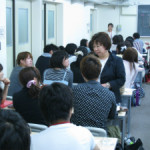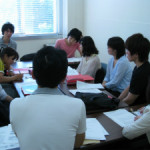Step 1 “Sharing” is a step where students gain the ability to build the foundation for professional attitude and communicate with patients/service users and students in other departments.
Step 1 takes place during the first half of the first year (from late April to mid-June, a total of 8 sessions).
In order to foster understanding of patients and service users—the most basic premise in the realization of patient/service user-centric medical care—among students at the stage where they began studying to become medical professionals, Step 1 mainly consists of programs such as “Listening to the Experience of the Parties Involved” and “Hands-on Practical Training” to directly interact with patients and service users.
Students will obtain basic knowledge on IPW through lectures on the need of IPE and the roles of each profession and master basic communication skills through a communication workshop. Then, they will participate in a series of group works based on their experience in practical training, examine the way cooperation should be for patient and service user-centric medical care, prepare a poster, and present it at the study outcome presentation.
Step 1 aims to have students master the foundation of IPW such as communication skills, understanding others, mutual respect, and the attitude for cooperation while they go through the process of cooperating and thinking together with students in other departments.
*The following describes the actual implementation for the fiscal year 2013.
[Students]
A total of 290 students including 118 freshmen from the School of Medicine, 84 freshmen from the School of Nursing, and 88 freshmen from the Faculty of Pharmaceutical Sciences
*76 groups of 3 to 4 students from various undergraduate schools were created to form 38 units.
[Learning Objectives]
Ability to build the foundation for professional attitude and communicate with patients/service users and students in other departments. Students will be able to do the following after completing Step 1:
- To think what is necessary to grow as a professional
- To understand and respect the role and function of each team member
- To explain the initiative and achievement of the team
- To understand the experience and desire of patients and service users based on the communication with them
- To communicate positively with their team members, other professionals, and faculty members
- To fulfil own responsibility in order to achieve team’s goal
[Learning Contents]
| Session | Date | Content | Location |
|---|---|---|---|
| 1 | 4/24 | Lecture: The history and meaning of IPE Orientation: The study method under IPE Lecture: The role, function and education of physician, nurse, and pharmacist Orientation: Group work on the history of medical care |
Faculty of Pharmaceutical Sciences 120th Anniversary Memorial Hall |
| 2 | 5/1 |
Lecture/Exercise: Communication workshop Group work: The history of medical care |
Lecture rooms of School of Medicine, School of Nursing, and Faculty of Pharmaceutical Sciences (3 classrooms) |
| 3 | 5/8 |
Guest lecture: Listening to the Experience of the Parties Involved Group work: The history of medical care Presentation: Presentation on the outcome of the history of medical care group work |
Faculty of Pharmaceutical Sciences 120th Anniversary Memorial Hall Lecture rooms of School of Nursing and Faculty of Pharmaceutical Sciences (6 classrooms) |
| 4 | 5/15 |
Lecture: Protecting personal information Lecture: Infectious disease control Orientation: Hands-on Practical Training Group work: Preparing for the Hands-on Practical Training |
Faculty of Pharmaceutical Sciences 120th Anniversary Memorial Hall Lecture rooms of School of Medicine, School of Nursing, and Faculty of Pharmaceutical Sciences (3 classrooms) |
| 5 | 5/22-5/29 |
Practical training: (1) Hands-on Practical Training or (2) Self-study Practical Training *Visit each hospital in a group and listen to patients’ stories for about 30 minutes. *The training for the first groups was conducted on May 22 and for the second groups was conducted on May 29. Self-study on the day not visiting hospitals. |
Chiba Aoba Municipal Hospital, Chiba Kaihin Municipal Hospital, Chiba Cancer Center, Chiba Rehabilitation Center, Japan Community Health Care Organization Chiba Hospital Dialysis Center, Chiba University Hospital |
| 6 | 6/5 |
Group work: Reviewing the Hands-on Practical Training (Sharing and reflecting on the learning) |
Lecture rooms of School of Medicine and School of Nursing (19 classrooms) |
| 7 | 6/12 |
Group work: Preparation for the study presentation (prepare a poster that summarizes the learning in Step 1) |
Lecture rooms of School of Medicine, School of Nursing, and Faculty of Pharmaceutical Sciences (3 classrooms) |
| 8 | 6/19 |
Presentation: Presentation of study outcomes (top 3 posters rated by students) |
Faculty of Pharmaceutical Sciences 120th Anniversary Memorial Hall |
*All conducted in the third and fourth periods
[A Look at Class]
 A look at the communication workshop
A look at the communication workshop
Students strive to master basic communication skills in preparation for group work and the Hands-on Practical Training. After completing the Hands-on Practical Training
After completing the Hands-on Practical Training
Students reflect on what the patients were saying, how their own behavior was, etc. and discuss and share in a group what they felt and thought. They take notes on the Group Study Worksheet before they forget. Reviewing the Hands-on Practical Training
Reviewing the Hands-on Practical Training
Students spend 90 minutes during the week following the Hands-on Practical Training and review the Hands-on Practical Training in a unit. Two faculty members from the School of Medicine, School of Nursing, and Faculty of Pharmaceutical Sciences participate in each unit’s (about ten students) activity in order to support students in reviewing (the two forefront individuals are the faculty members).